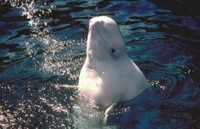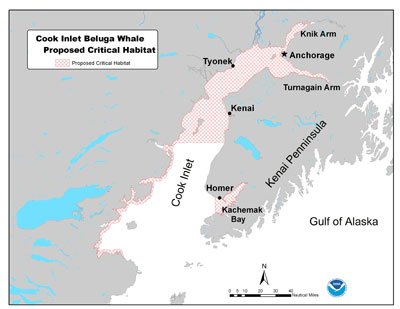Aug 23 2011

A drilling rig is up and running in Cook Inlet, along the southern Alaska coast. The rig, which will remain in the Inlet for 8 or more years, drilling numerous wells during the short summer seasons, expects to complete this first oil and gas well by the end of October, well before ice develops. Local environmental groups pressed the Army Corps of Engineers and NOAA to not allow the rig into the inlet, citing concerns that oil and gas development activity will negatively impact a recently-designated 3000-square mile critical habitat for the critically endangered local beluga whale population. In addition to possible impacts of a spill, noise from drilling in a central concern. The permits allowing drilling require the company to maintain beluga observation crews, and to reduce the speed (and thus noise) of the drill when belugas are nearby, and shut down operations if they come very close.

Cook Inlet is over a hundred miles long, with Anchorage at its inner end; this is also the section of the Inlet that is now designated as critical habitat. The first drilling operation is in the central part of the critical habitat, between Kenai and Tyonek on the map below.For more on the situation, see the two links above, which go to fairly detailed articles in the local media, and see these two previous AEI posts about the Cook Inlet belugas.
Nov 05 2010
The International Association of Oil and Gas Producers (OGP) has re-instated its Decommissioning Committee, in light of the fact that many of the over 5000 offshore oil rigs are nearing the end of their operating life. A UK Decommissioning Conference was held in October, and during 2011 the OGP Committee “aims to establish programmes to study the environmental consequences of decommissioning and examine technology development, best practices and benchmarking.”
Certainly, given today’s increasing awareness of the effects of noise on marine life, it’s likely that environmental assessments of decommissioning activities will include consideration of their acoustic impacts. Most likely, increased noise will be relatively short-duration (in the scale of weeks or months); in regions where multiple decommissioning projects are underway at once, there may need to be consideration of the cumulative impacts.
In the October issue of the OGP newsletter, the reinstatement of the Decommissioning Committee was noted as follows: Read the rest of this entry »
Sep 22 2009
As the extended public comment period expired for input into the Obama administration’s approach to offshore oil and gas exploration, public pressure mounted to take a time-out on plans for expanded development in Alaska’s offshore waters. During the Bush administration, the Minerals Management Service began planning for offering new leases in the Beaufort Sea (north of Alaska), Chuckchi Sea (northwest of Alaska, north of the Bering Strait) and in Bristol Bay (north of the Aleutian peninsula). Native groups and environmentalists have expressed concern about noise impacts on sea life during exploration, and risks to the fragile ecosystem should full-scale development proceed. Signatures from 300,000 people supporting a halt in new leasing and drilling were delivered to the Department of Interior in DC, and a letter signed by 400 scientists urged the administration to “take a time out from offshore industrial activity to allow for a precautionary, science-based approach that better assesses the consequences of development in a rapidly changing ecosystem.” One of the key arguments made in recent years has been that the Arctic environment is changing rapidly in response to global warming, and that further stressing habitats with oil and gas development is ill-advised. “We still have a chance to do it right in the Arctic. All we’re really asking is that for once we look before we leap,” said Jeffrey Short, Pacific science director for Oceana and former National Oceanic Atmospheric Administration research chemist. That means taking a precautionary, science-based approach to oil and gas development, including assessing environmental impacts before issuing permits, sustained monitoring and comprehensive planning to determine the best way to proceed, the scientists say.
Jan 13 2008
Chukchi Lease Sale Set for February, Locals Seek Delay – The US Minerals Management Service has issued notice of its first oil and gas lease sale since 1991 along Alaska’s northwest coast. The sale, scheduled for February 6, covers about 25 million acres, out to about 200 miles offshore. The sale area will not include near-shore waters ranging from about 25 miles to 50 miles from the coastline, which includes the near-shore area through which bowhead and beluga whales, as well as other marine mammals and marine birds, migrate north in the spring, and in which local communities subsistence hunt. North Slope Borough Mayor Edward Itta said, “With all the changes happening out in the Chukchi Sea, I don’t think we should be adding to the problem with offshore oil exploration.” Read the rest of this entry »


